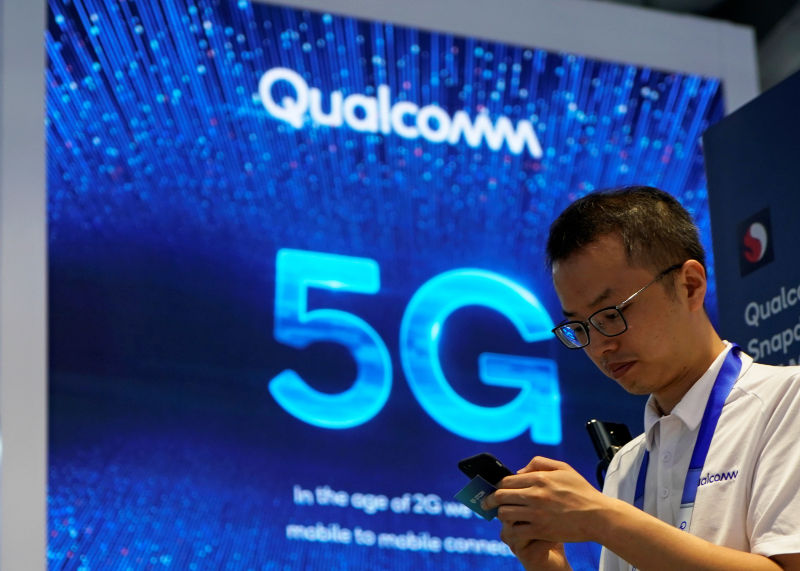US chip supplier Qualcomm issued a higher than expected forecast of quarterly sales and profit on Wednesday, saying it is benefitting from greater demand in China for phones with artificial intelligence features.
The group, based in San Diego in California, said it was selling a greater number of chips, and more expensive chips, for Android smartphones.
After a smartphone slump last year, Qualcomm said that China’s Android market – which has become critical to the company – has started to pick up, with consumers there shifting toward purchasing higher-priced devices that can accommodate AI chatbots.
ALSO SEE: Microsoft Ramps up Cloud, AI, Data Centre Investment in SE Asia
Qualcomm shares were up 4% in after-hours trading.
The company said its sales to Chinese smartphone makers had grown 40% in the first half of its fiscal year, a sign of recovery in that market.
“AI is driving a lot of silicon content in those devices because of the expected computational capability to run those models,” chief executive Cristiano Amon told analysts on a conference call. “Users want to buy a more capable phone that can run AI.”
Qualcomm has faced competition from Huawei Technologies, which last year introduced a flagship 5G smartphone that uses its own chip made by subsidiary HiSilicon.
But IDC analyst Phil Solis said that for the moment, it appears that a general trend toward more capable devices is helping Qualcomm more than Huawei’s competition is hurting the US company.
Growing market for some, but not Apple
“The Chinese smartphone market is recovering and shifting more to premium phones, so while HiSilicon takes share with flagship Huawei phones, the total market is growing, especially where Qualcomm gets most of its revenue from,” Solis said.
Qualcomm forecast third-quarter sales and adjusted profit with midpoints of $9.2 billion and $2.25 per share, beating analyst estimates of $9.05 billion and $2.17 per share, according to LSEG data.
Qualcomm is the world’s biggest supplier of chips for smartphones and counts both Apple and Samsung as customers.
Qualcomm’s forecast for the recovery in China’s smartphone market recovery may not extend to Apple’s iPhone.
Apple reports results late on Thursday, and analysts expect its deepest quarterly revenue decline in over a year as it wrestles with competition in China from Huawei and other companies selling cheaper smartphones.
Not surprisingly, Apple is now thought to be planning to add generative AI to its iPhones to rebuild its sagging revenues.
While Qualcomm executives talked about signs of recovery among Android handset customers such as Oppo and Vivo, wireless connectivity chipmaker Qorvo on Wednesday forecast quarterly results below Wall Street estimates, saying it expected weak demand from the flagship smartphone market, sending its shares down more than 11% in after-market trading.
Qorvo depends more heavily on Apple sales than Qualcomm.
For Qualcomm’s fiscal second quarter ended March 24, sales and adjusted profit were $9.39 billion and $2.44 per share, respectively, above analyst expectations of $9.34 billion and $2.32, according to LSEG data.
Qualcomm is hoping to benefit from consumer demand to upgrade devices to run AI chatbots directly on the device rather than going over to a data centre.
In a challenge to Apple, Qualcomm plans to release a chip designed to power laptops starting this summer, though that small amount of early sales is unlikely to play a major role in the company’s third-quarter forecast, analysts said.
In Qualcomm’s chip segment, the company forecast fiscal third-quarter sales with a midpoint of $7.8 billion, compared with analyst estimates of $7.74 billion, according to LSEG data.
Qualcomm predicted third-quarter patent-licensing sales with a midpoint of $1.3 billion, compared with estimates of $1.29 billion.
For the just-ended fiscal second quarter, Qualcomm said chip and licensing revenues were $8.03 billion and $1.32 billion, respectively, compared with analyst estimates of $7.95 billion and $1.32 billion, according to LSEG.
Within Qualcomm’s chip business, the company said that mobile handsets generated $6.18 billion in sales in the second quarter, compared with estimates of $6.23 billion, according to data from Visible Alpha.
Automotive and Internet-of-Things chip revenues in the second quarter were $603 million and $1.24 billion, respectively, compared with analyst estimates of $578.9 million and $1.22 billion.
“Demand for all their products overall seems strong,” said analyst Ben Bajarin of Creative Strategies. “The auto business is particularly interesting as they keep growing while others who compete there keep struggling.”
- Reuters with additional editing by Jim Pollard
ALSO SEE:
Apple to Focus on China, Roll Out AI iPhones to Revive Sales
Huawei Takes Another Bite Out of Apple’s Market Share in China
China Orders Apple to Cut WhatsApp, Threads from App Store
Apple Eyes Indonesia Fab as it Reduces China Reliance – AP
Apple iPhone Sales Slump 10%, Samsung Claims No1 Spot
TSMC’s AI Bet Triggers Mega Chip Rally, Except in China
Intel to Take on Qualcomm, Nvidia in Auto AI Chip Fight
UN Chief: Big Tech Chasing AI Profits Ignoring Risks – Guardian
























